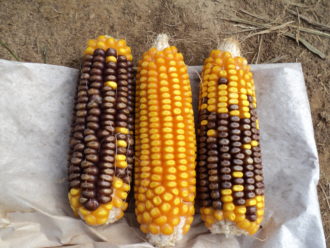KNOXVILLE, Tennessee – Breeders with the University of Tennessee are developing organic corn varieties that cannot be contaminated by GMO corn (genetically modified organisms) via cross-pollination.
In a three-year, Southern Sustainable Agriculture Research & Education (SSARE)-funded project, researchers crossed white and yellow Tennessee corn lines with genetic stocks that contain a cross pollinator inhibitor gene. The result is the development of 6 corn hybrids that can be potentially used by organic growers to lessen the risk of GMO contamination.
“A single GMO corn plant commonly produces more than two million pollen grains, which may be carried more than a half-mile by wind. This long distance cross-pollination can result in GMO contamination of the grain of non-GMO varieties,” said Dennis West, a professor with the Department of Plant Sciences. “Production of corn varieties that have the cross sterility allele will reduce the risk of cross contamination. This will prevent economic loss to organic and other producers who target the non-GMO corn market.”
In the SSARE project (LS12-253), “Breeding Organic Corn Varieties to Resist GMO Contamination,” Tennessee elite corn lines T175, T177, T274, and T276 were crossed to corn lines obtained from the National Plant Germplasm System (NPGS) with a cross-sterility allele, Ga1s. An allele is an alternative form of a gene, and can be dominant or recessive.
The allele, Ga1s, was identified in corn as early as 1926. The allele prevents fertilization by pollen of corn varieties that do not carry the allele.
“All of the commercial field corn hybrids marketed in the U.S. carry the recessive form of the allele, which is inactive on the silks of Ga1s plants,” said West. “We wanted to breed the dominant form of the gene into white and yellow-grained public hybrids with the idea that the grain produced on Ga1s hybrids will be the result of pollination by plants that have the Ga1s gene, and grain on Ga1s hybrids grown in the same field as non-Ga1s GMO hybrids will be free of the GMO contamination.”
In the study, once the first cross was made, the following generations were backcrossed to the recurrent parent. This method required that individual plants from a segregating population be self-pollinated and cross-tested to a Ga1s tester to identify plants that had the Ga1s allele. Crosses that produced seed on the Ga1s tester were positive for the Ga1s allele and, in the next generation, progeny of those plants were backcrossed to the recurrent parent line.
“We identified plants from each elite Tennessee line that carried two of the same Ga1s allele,” said West. “Three experiment Ga1s lines from each recurrent parent were then selected, and these lines are being used to produce experimental hybrids for further evaluation.”
Although the SSARE-funded project has ended, researchers are continuing with the breeding project.
“We will be testing six corn hybrids that carry the GMO cross-pollinator inhibitor gene. These hybrids will be compared to their commercial field hybrid GMO counterparts,” said West. “It is our hope that the trial will help select the best hybrids for producers and seedsmen, as well as increase the seed of each of the parental lines in order to make the germplasm available to those who wish to produce their own GMO-resistant corn seed.”
The breeding project is expected to continue for two more years.
Published by the Southern Region of the Sustainable Agriculture Research and Education (SARE) program. Funded by the USDA National Institute of Food and Agriculture (NIFA), Southern SARE operates under cooperative agreements with the University of Georgia, Fort Valley State University, and the Kerr Center for Sustainable Agriculture to offer competitive grants to advance sustainable agriculture in America's Southern region. This material is based upon work that is supported by the National Institute of Food and Agriculture, U.S. Department of Agriculture, through Southern Sustainable Agriculture Research and Education, under sub-award number: LS12-253. USDA is an equal opportunity employer and service provider. Any opinions, findings, conclusions, or recommendations expressed in this publication are those of the author(s) and do not necessarily reflect the view of the U.S. Department of Agriculture.


